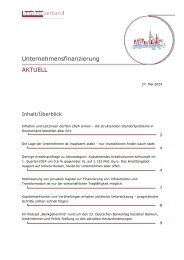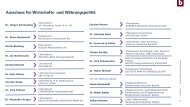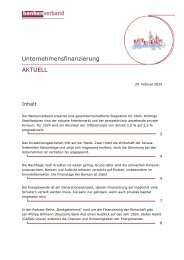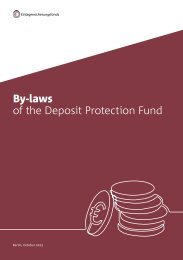Strong banks for a single European financial market
The last few years have seen the EU take its first steps towards establishing a single European financial market. But these aren`t yet enough! In the following pages, we outline measures that will help to create a single European market.
The last few years have seen the EU take its first steps towards establishing a single European financial market. But these aren`t yet enough! In the following pages, we outline measures that will help to create a single European market.
Create successful ePaper yourself
Turn your PDF publications into a flip-book with our unique Google optimized e-Paper software.
Example: waivers<br />
With the help of cross-border capital and liquidity waivers,<br />
<strong>banks</strong> could deploy capital in Europe where it is needed<br />
to generate economic growth. We estimate that billions<br />
of Euro of regulatory capital and liquidity could be freed<br />
up <strong>for</strong> the G-SIBs of the Eurozone alone.<br />
would be significant administrative relief <strong>for</strong> <strong>banks</strong> and customers.<br />
When setting up a central repository of this kind,<br />
however, it will be essential to ensure that data requests from<br />
other sources are simultaneously dropped. Otherwise, we<br />
will merely end up adding a further layer to an even more<br />
expensive and convoluted regime.<br />
The reporting regime has been repeatedly extended and,<br />
at some <strong>banks</strong>, the number of staff handling reporting has<br />
doubled despite the general cutback in personnel. This raises<br />
the pressing question of whether the more than 60,000 data<br />
fields that supervisors can ask <strong>banks</strong> to complete in the context<br />
of FINREP alone can be evaluated in an effective way at<br />
all, or whether it is not time to limit ourselves to less, but<br />
more meaningful and standardised data. The first step should<br />
be to establish standardised definitions of the data involved.<br />
At present, the in<strong>for</strong>mation reported by <strong>banks</strong> in different<br />
member states sometimes differs widely. We would also recommend<br />
that the various national and <strong>European</strong> authorities<br />
coordinate their data requests much better. New solutions are<br />
needed to reduce overlaps when drawing up and applying<br />
reporting requirements. Ideally, a central, EU-wide data repository<br />
should be established. Be<strong>for</strong>e issuing new requests <strong>for</strong><br />
data, supervisory authorities could check to see whether the<br />
desired data already existed. This would allow authorities<br />
to access existing data more quickly and <strong>banks</strong> would not<br />
need to complete new data fields unnecessarily. The result<br />
Example: definitions<br />
While <strong>banks</strong> in some member states report loan-to-value<br />
ratios using the purchase price of property as the basis<br />
<strong>for</strong> their calculations, Germany takes a more conservative<br />
approach and uses the collateral value. As a result, the<br />
reported data is not really comparable.<br />
Banks also face the problem of having to constantly make<br />
adjustments in response to new reporting requirements,<br />
thus tying up a large part of their IT budget. Even small<br />
changes can be time-consuming and costly, as they have to<br />
be thoroughly tested to see how they interact with the rest<br />
of the system. These resources could be better invested in<br />
developing digital innovations.<br />
Example: adjustments<br />
More long-term planning should go into reporting requirements<br />
and changes should be consolidated and introduced<br />
throughout Europe on certain predefined dates so as to<br />
keep the administrative workload manageable.<br />
Banking union 7


















